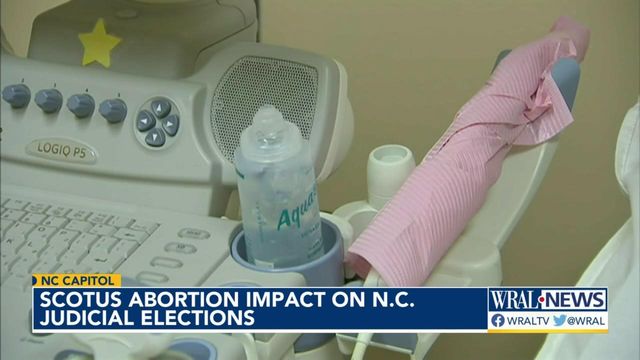Abortion one more issue to juice interest in NC's partisan judicial races
There are a lot of "ifs" between now and new abortion laws in North Carolina, but if they come, expect a lawsuit, brightening the spotlight on the state's partisan judicial races
Posted — UpdatedThe U.S. Supreme Court’s looming decision on abortion rights is brightening the spotlight on North Carolina’s partisan judicial elections.
North Carolina Supreme Court races have already become high-profile, expensive affairs, and an open seat on the court this year, along with the state’s oft-litigated partisan power battles, have already set a fire under the campaigns.
The state court is expected to play a continued role in disputes over redistricting, voter rights and education funding. Abortion could be in its future.
With a Democratic governor in Roy Cooper, who has vetoed abortion restrictions in the past, new restrictions will be difficult for North Carolina Republicans to pass. The GOP already holds majorities in both chambers of the state’s General Assembly, and with every legislative seat up for election this year, it’s possible they could win a supermajority and pass new laws over Cooper’s veto.
If that happens, there’s little doubt lawsuits would be filed at the state level as a last-gasp effort to protect abortion rights under the state constitution. Will that possibility juice turnout in the state’s judicial races?
“It should,” former state Supreme Court Justice Bob Orr said. “I don’t think in this election cycle it will. But it’s certainly increasing the awareness.”
Judges are elected in North Carolina via partisan elections, and two eight-year terms on the state Supreme Court are up this year, along with four seats on the North Carolina Court of Appeals and dozens on local courts.
Abortion is one more thing. “It probably increases general awareness of the importance of who the judge is,” Orr said.
“That was scary,” coalition Executive Director Tami Fitzgerald said Thursday. “I think as we move into the general elections in the fall, I think voters will wake up and realize these are important races.”
Fitzgerald’s group has pushed for years to restrict abortion in North Carolina, and it plans to renew that push once the U.S. Supreme Court finalizes its decision, which is expected this summer.
The court’s final wording, and how far it goes, will be key. Fitzgerald declined to get into details Thursday on bills she’d like to see the state legislature enact, saying the coalition will be “working to build consensus around the strongest protections possible.”
Anything that becomes law is sure to see a legal challenge, but Orr and Sarah Preston, a lawyer and the North Carolina American Civil Liberties Union’s former policy director, said the language in North Carolina’s constitution doesn’t seem to offer any stronger protection of abortion rights than the U.S. Constitution.
Still, “that would undoubtedly land in the courts,” said Preston, the executive director of Lillian’s List, which works to recruit and train female political candidates.
“But I would put my primary attention on the legislature,” Preston said. “That is the first battleground over this issue if the opinion comes out as we expect.”
• Credits
Copyright 2024 by Capitol Broadcasting Company. All rights reserved. This material may not be published, broadcast, rewritten or redistributed.





